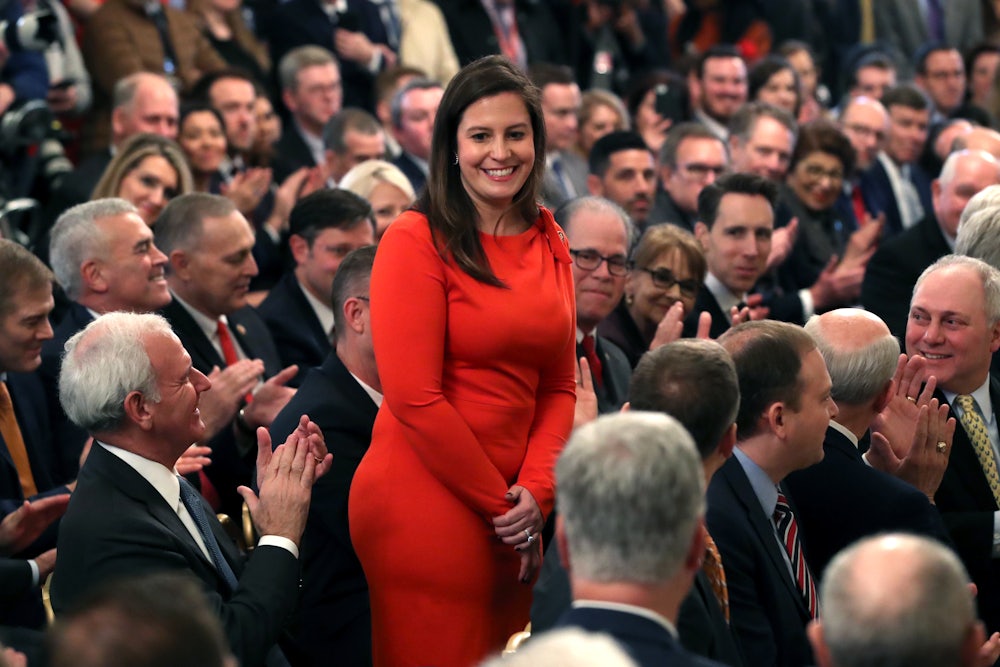Not so long ago, Liz Cheney was being presented as “a new thought leader for the GOP” and even the second coming of Margaret Thatcher. As Donald Trump continued to spread wild lies about the 2020 election, political reporters upheld Cheney as a voice of reason and a beacon around which “principled” Republicans could gather.
The Washington media loves an intraparty split, and in Cheney’s apostasy they thought they had it. True conservatives—those who favored government so small you could drown it in a bathtub and endless foreign wars—could rally around Cheney. Those devoted to authoritarianism and the perpetuation of a Dear Leader cult would continue worshipping Donald Trump. These factions would duke it out to decide the most important political narrative of all: the Future of the Party.
When Cheney survived an attempt to strip her of her leadership role in the House Republican caucus earlier this year, it was seen as a triumph for her camp. It meant that there was a possibility, no matter how slim, of a GOP shorn of Donald Trump. Liz Cheney, Mitt Romney, and the last remaining members of the Lincoln Project might finally fulfill the Never Trump dream.
It hasn’t turned out that way at all. A second bid to oust Cheney from her leadership role will almost certainly succeed. Her likely replacement, Elise Stefanik, has a far more moderate voting record than Cheney and was far more likely to buck Trump when he was president. But when it has counted—on impeachment and on the Big Lie that the election was stolen, in particular—she has been a rabid supporter of Trump, even by the standards of congressional Republicans.
The differences between Cheney and Stefanik, who was a loud and vocal critic of Trump in the lead-up to the 2016 election, have led to some consternation in the press, which has marveled at the willingness with which the GOP has cast off the scion of one of the most important conservatives of the last half-century in favor of an unscrupulous climber. But it’s Stefanik’s total lack of principles that makes her the perfect fit for the current GOP.
Appearing on Fox & Friends last July, Liz Cheney actually made the case that she was one of Trump’s most devoted allies in the House. She voted with the president “something like 97 percent of the time,” she said. “I find, in my experience, the president appreciates people who are direct, people who explain what they think. But I think, most of the time, far more of the time we agree than we disagree.”
Cheney wasn’t far off the mark. According to FiveThirtyEight, she voted with Trump between 93 and 96 percent of the time while he was in office. The conservative political advocacy group Heritage Action gives Cheney a lifetime score of 80 percent, an impressive mark that reflects her conservative credentials.
Stefanik, by contrast, is practically an apostate. Her Heritage Action score is 48 percent. She voted with Trump only two-thirds of the time since 2018. Having worked for George W. Bush and Paul Ryan, Stefanik, who represents a district in the Adirondacks in New York, cut a moderate, bipartisan image. In 2016, she endorsed Trump but not by name (she tactfully said she would be supporting her “party’s nominee”). She voted against his most important legislative achievement, the 2017 corporate tax cut, as well as the decision to withdraw from the Paris climate accord. CNN’s Andrew Kacyzinski and Em Steck found that she had “criticized Trump over everything from his incendiary comments about Muslims and women to his signature policy positions, such as reforming NATO, building a U.S.-Mexico border wall, and having stronger cooperation with Russia.”
But the voting scores are misleading in a couple of ways. One is that Stefanik became a star on the right in 2019 as one of Trump’s most vocal defenders during his first impeachment; that marked a turning point for her. She has since repeatedly defended Trump’s lies about election fraud, even going so far as to defend her decision to vote against the certification of Biden’s electoral win, a farce that contributed to the riot at the Capitol.
The voting-record differences between Stefanik and Cheney are also being overblown. Jeff Flake and Bob Corker were two of Trump’s most vocal critics when they served as Republicans in the Senate; both voted with Trump about 84 percent of the time, per FiveThirtyEight. Trump was, moreover, often disengaged from the legislative process. What mattered to him was personal loyalty on whatever issue he happened to be obsessing over: the Mueller investigation, impeachment, the 2020 election. You could vote with him 97 percent of the time, but if you weren’t with him on those issues none of that mattered. Similarly, you could vote with him 60 percent of the time and be considered a key ally.
There have been attempts to make all of this out to be standard cloak-and-dagger stuff, rather than the latest data point in the Republican Party’s anti-democratic lurch. Eliana Johnson argued in Politico that the dust-up had “more to do with the inside game essential to political survival in Washington, including Cheney’s ability—or inability, as the case may be—to cultivate the loyalty of colleagues, donors and friendly journalists.” Politico also made the case that the MAGA crowd’s affection for Stefanik was a point in her favor but not the only one. Stefanik is “a prolific and high-profile fundraiser, is considered an effective party messenger, and launched a PAC dedicated to electing more Republican women.”
But Cheney’s unpopularity isn’t just about the “inside game”—it stems directly from her increasing willingness to criticize Donald Trump. At the same time, her steadfastness on conservative policy issues just doesn’t cut it anymore. The GOP isn’t interested in policy: Its only vision for the country is that Donald Trump won the 2020 election and that everything possible must be done to ensure that a Democrat does not win a presidential election again. In that party, Stefanik is a perfect fit.








